Solar is booming. There are now more than 2 million homes and businesses in the U.S. using solar PV systems and prices to install are the lowest they’ve ever been, according to the Solar Energy Industries Association (SEIA). With declines in component costs and improvements in solar and battery technology, the solar trend is accelerating.
If you’re a home or business owner consider whether to get solar panels, it’s best to break down the question into more manageable points. Among the FAQ resources on Let’s Go Solar are articles that answer the following questions:

Let’s Go Solar provides below a brief overview of the resources that address each of these questions, as well as links to articles that provide more detail and depth on each subject.
1. Do Solar Panels Increase Home Value?
Homeowners know that solar can save them money on utility bills. But can solar actually make a homeowner money by increasing the value of their home at the time of resale?

The short answer is yes, it does. A 2019 report by Zillow found that homes with solar panels sell for 4.1 percent more. That comes out to $9,274 for a median-valued home. The U.S. Department of Energy states that a solar electric system raises a home’s property value by $20 for every $1 in utility savings per year.
While $9,000 is the average add-on value for a solar home, the actual resale value of an individual home depends on a number of factors, including the size and age of the installation; whether the solar installation is owned or leased; availability of federal and municipal tax incentives; utility company rates, restrictions or incentives; and characteristics of an individual market area.
Homeowners who own their systems have the most to gain since the increase in the value of the home at resale goes directly into their pockets. However, many homeowners now choose to lease their solar. These owners enjoy lower utility costs and avoid the upfront investment in purchasing and installing a solar system, but the system is actually owned by the leasing company. The buyer will need to agree to a new contract with the leasing company and may have challenges in finding bank financing for a cost that is not a real property asset.
Let’s Go Solar reviews various solar ownership types – purchased, leased, power -purchase agreements, Fannie Mae HomeStyle mortgage and other financing options – to provide a more detailed examination of how solar panels increase the resale value of a home.
2. How Much Can I Save with Solar Panels?

Homeowners know that solar can save money on utility bills. But how much? Let’s Go Solar assembled solar experts to outline four ways that solar systems can save homeowners money.
.Tax Incentives and Rebates: Federal and State
A home solar system typically comes with a package of federal and state tax incentives, credits and/or rebates designed to encourage solar energy use. These incentives and rebates offer a substantial cost benefit to homeowners. Federal incentives come in the form of an Investment Tax Credit (ITC) for qualifying residential and commercial systems. The ITC will be 30 percent until 2019, 26 percent in 2020, and 22 percent in 2021. Some state governments offer incentives and/or rebates, sometimes sponsored by utility companies operating within the state. LGS provides links that identify rebates and incentives in each state.
Protection Against Rising Utility Rates
Consumers in many states have faced increases to their electricity bills over the last decade due to factors like fluctuating oil, coal and natural gas prices and federal regulations on emissions and greenhouse gasses. Homeowners can choose solar as a guard against these rising rates. While solar requires a substantial upfront investment to purchase and install the system, solar produces electricity cost-free and is not subject to the fluctuating costs of fossil fuels.
Net Metering
Sell your power back to the grid – net metering. The rules vary by state and sometimes by utility company.
Net metering is a billing process that allows solar energy system owners to feed excess electricity generated by their systems onto their current utility’s grid and get credited or paid for doing it. In most cases, homeowners “sell” their system’s electricity to the utility during peak usage hours and “buy” utility-provided electricity during off-peak hours, often leading to a net monetary gain for the homeowner. The whole process is monitored through the utility’s home meter that will actually run backwards whenever the solar system is inputting electricity into the grid. Hence the term “net metering.”
The amount of money a homeowner can save depends on local regulations and power company policies. Let’s Go Solar reviews conditions in several states as examples.
3. Is Solar Worth It?
For the individual homeowner, a solar system has a number of benefits, including cost savings on electricity and an improvement in the resale value of the home. An added psychological and social benefit is knowing that you are doing your part to reduce carbon-based environmental damage.
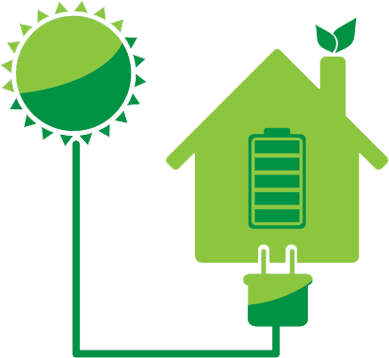
But just how much tangible benefit can there be from an individual home going green? And what is the overall impact of tens of thousands of homeowners making a similar decision to use solar as their source of energy?
To better understand the economics of solar requires a look at the big picture, the “macroeconomics” of solar: How the U.S., and the world, currently consume energy; how solar is changing that equation; the impact of solar on the national and global economy; and what strides the solar industry has made and can make in lowering the cost of solar energy. Let’s Go Solar tapped experts in the field of solar energy and economics to get insight into the macroeconomics of solar today, and to forecast how solar will permanently change the future of energy generation.
4. How Many Solar Panels Do I Need?
If you envision money-saving clean energy solar panels on your roof, you naturally have a good first question: “How many solar panels will I need?” Let’s Go Solar walks a homeowner through the process of determining how much power you’ll need, based on residential home power use, the type of solar system you choose, and your budget.
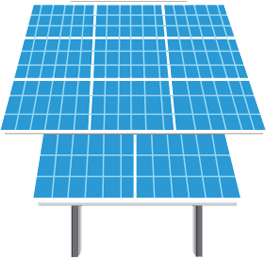
A look at the past year’s worth of utility bills will provide the information you need to know your total usage. In finding the right number of solar panels, a homeowner needs to consider whether to invest in a system that provides for all energy needs or perhaps a smaller system that helps offset “peak energy” usage, the parts of the day when usage and utility rates are highest. A homeowner might be more likely to purchase a larger system tied to the utility grid if the utility provides for “net metering,” which means the utility will purchase any excess electricity generated by your solar system.
Let’s Go Solar reviews all these factors, as well as providing practical advice based on the size of your roof, your orientation toward the sun, and variations in size and energy efficiency of various solar panel brands and types.
5. How Long Do Solar Panels Last?
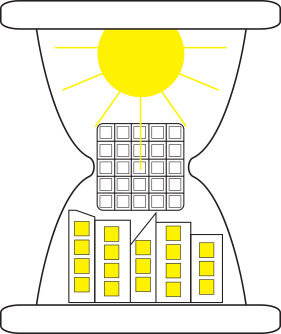
The average life expectancy of a solar panel is approximately 30 years, which is a decade longer than the typical manufacturer’s warranty. Depending on the quality of the panel, the weather patterns in your particular area, and how well you maintain your panels, the actual lifetime may extend beyond the three-decade mark.
While the long lifetime of solar panels is certainly good news for a homeowner, the industry is seeking to improve all aspects of solar technology, including solar panel lifetimes. Commercial solar companies and governmental entities are working on ways to extend the lifespan of panels, while also developing systems and regulations that guide recycling and disposal programs.
Let’s Go Solar takes an in-depth look at the factors that have an impact on the lifetime of a homeowner’s solar panel system, including the anatomy of a solar panel failure and how to do to fix it and prevent its recurrence. You’ll also learn about cutting-edge work in solar industry Research and Development (R&D) centers, and practical tips on recycling your solar panels.
6. What Is a Solar Battery?
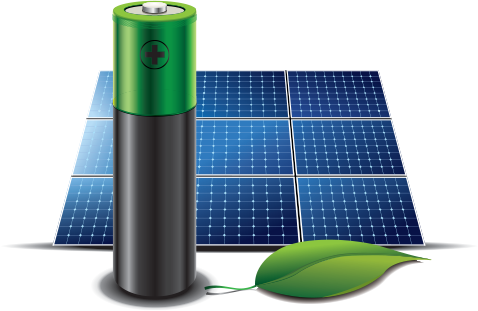
When considering solar for a home, a homeowner naturally thinks of solar panels. But while solar panels are the most easily identified part of a home solar system, solar batteries can play a very important part in the process. All that energy from the sun flows from the solar panels into a battery array, where the energy is stored for use. Your home electricity use is actually drawing power from the batteries, not the panels themselves. And additional devices are connected to the batteries: an inverter, which transforms the battery’s direct current (DC) power into the alternating current (AC) power used by most home appliances; a controller, which directs the power to the appropriate appliances and provides a readout of energy generation; and a meter, which measures electricity use in the home, or flowing out to the grid for those homes that contract to sell excess electricity to the utility company.
As with batteries for your automobile or truck, batteries for a residential solar system vary in capacity and the efficiency with which they store energy. Let’s Go Solar takes an in-depth look at how solar batteries work, what factors affect their efficiency, and how to choose the best battery options for your solar panel system.
7. How Are Solar Panels Made?
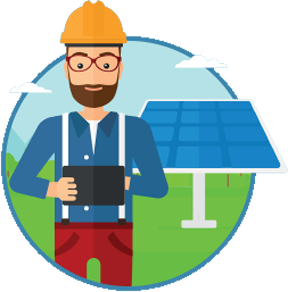
As solar energy use becomes more prevalent, so does information about how it’s harnessed and used. Photovoltaic solar panels can be found in both commercial and residential areas. Let’s Go Solar reviews the materials used to create solar panels, the various technologies behind different types and how the panels are manufactured.
Armed with knowledge about the technology of solar, a homeowner can make an informed decision about the type of panels best suited to his or her needs. This information is also useful in understanding the ecological and environmental impact of a move to “green” energy.
8. Should I Get Solar or Wind Power?
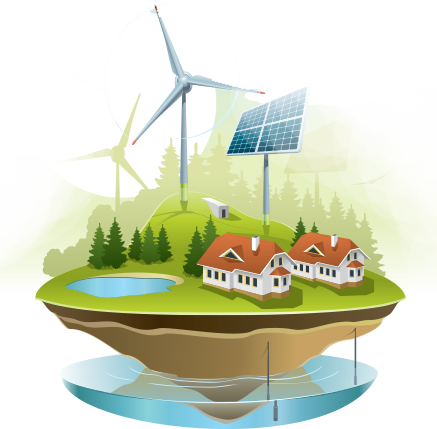
If you’re considering solar, you’ve probably wondered if wind power is a sustainable-energy possibility for your home or business. Find out the differences in how solar and wind work, the pros and cons of each, which types of locations are best for each and the costs involved. Explore answers to common questions and links to resources with helpful information.

